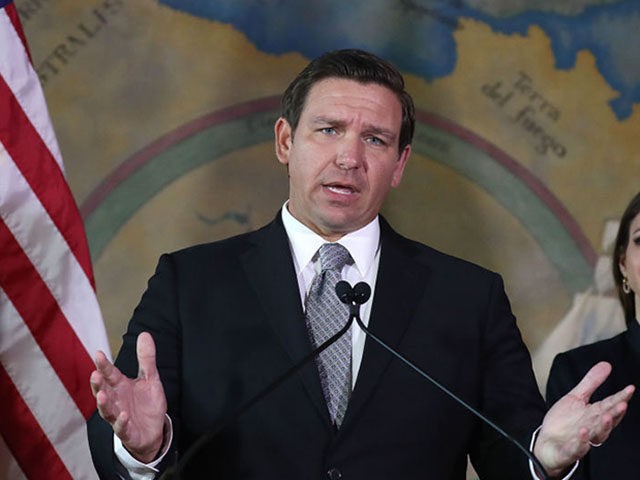Florida Gov. Ron DeSantis (R) on Monday signed landmark legislation banning the use of vaccine passports in the Sunshine State via Senate Bill (SB) 2006, which effectively serves as a safeguard against overreach from the state or local government.
State Rep. Tom Leek (R) described the bill as striking an “appropriate balance between protecting one’s safety and one’s personal liberty” — a balance the Republican governor has used as his primary guide throughout the pandemic despite criticisms from the establishment media and partisan political pundits.
DeSantis said during an event in St. Petersburg on Monday:
I think it’s the evidence-based thing to do. I think folks that are saying that they need to be policing people at this point, if you’re saying that you really are saying you don’t believe in the vaccines, you don’t believe in the data you don’t believe in the science.
SB 2006 effectively serves as a safeguard from government overreach, empowering the legislature to override restrictive emergency edicts from the office of the governor, no matter whom that individual may be.
“I think the Legislature looked and said, ‘Well, okay, what if we were in a California situation?’”the governor said. “What would the Legislature’s ability to be? And so they put safeguards for the people of Florida.’’
Per the bill, it is the “intent of the Legislature to minimize the negative effects of an extended emergency, such as a pandemic or another public health emergency.” It limits local emergency orders to seven days, allowing them to be extended once a week for 42 days. However, the governor can override the local emergency orders.
Local orders must be “limited in duration, applicability, and scope in order to reduce any infringement on individual rights or liberties to the greatest extent possible,” per the bill.
Additionally, the measure bans localities and businesses from forcing people to provide proof of receiving a vaccine for the Chinese coronavirus.
“Over the last year we’ve avoided protracted lockdowns and school closures in Florida because I have refused to take the same approach as other lockdown Governors,” DeSantis said in a statement.
“This legislation ensures that legal safeguards are in place so that local governments cannot arbitrarily close our schools or businesses,” he continued.
“In Florida, your personal choice regarding vaccinations will be protected and no business or government entity will be able to deny you services based on your decision,” he added, thanking the State Legislature for getting the measure “across the finish line.”
Per the governor’s office:
SB 2006 will ensure that neither the state nor local governments can close businesses or keep students out of in-person instruction at Florida schools, except for hurricane emergencies, and caps all local emergency at seven-day increments.
The legislation also allows the Governor of Florida to invalidate a local emergency order if it unnecessarily restricts individual rights or liberties. The bill also improves Florida’s emergency planning for future public health emergencies, by adding personal protective equipment and other public health supplies to the inventory of the Florida Division of Emergency Management.
Additionally, the legislation codifies the prohibition of COVID-19 vaccine passports. Governor DeSantis enacted this prohibition through an executive order last month, blocking any business or government entity from requiring proof of COVID-19 vaccination.
Thrilled to sign legislation that prohibits COVID-19 vaccine passports in Florida. Neither government, nor private businesses, will be able to condition your participation in everyday life on producing private health information. https://t.co/0NMBk1l9zI
— Ron DeSantis (@GovRonDeSantis) May 3, 2021
Last month, DeSantis signed an executive order banning the use of vaccine passports in the state, previewing that he hoped to sign a bill into law in the near future.
“The Legislature is working on making permanent these protections for Floridians and I look forward to signing them into law soon,” he said at the time.

COMMENTS
Please let us know if you're having issues with commenting.